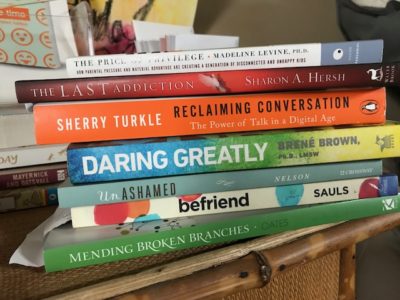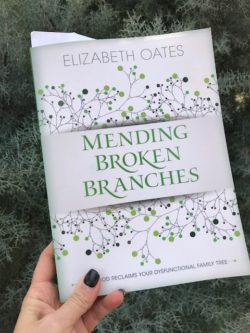As an author and pastor’s wife, I read alot of books. Some I read because I personally love the author and/or am interested in the subject matter. But many others I read simply to gain knowledge (and an opinion) about popular books others are reading, to learn about a topic, or to be better equipped to enter in with people facing various issues. To that end, on my nightstand currently I have a book on addiction, privileged kids, technology’s effects on relationships, shame, vulnerability, friendship/belonging in an age of judgment and divorce and dysfuncional families. 
Almost always, reading for any reason stimulates ideas that often find their way into a blog post. Such is the case with Mending Broken Branches.
The subtitle for this book is “When God Reclaims your Dysfunctional Family Tree.” It is written primarily for married women who have come from broken homes and carried with them into their marriages and parenting the baggage of divorce, addiction, abuse, mental illness and unhealthy boundaries that marred their upbringing. By God’s grace, I do not fall into the target audience; however, I found great value in the content and would recommend to several other sub-set audiences. Here’s who and why…
Parents Who Are Divorced or Whose Children Have Experienced Distress in the Family
Part One of the book focuses on identifying the feelings, fears and idolatry that have developed due to the shaping influences of past circumstances. Therefore, for those parents who are divorced, or whose children have witnessed addiction or been victim of abuse, reading through this section will help you better understand what your child may be feeling (as hard as that may be). But you can also use the material to help them deal honestly with their feelings instead of suppressing it into adulthood. While you may say they are seeing a counselor for that, I think by you opening up the dialogue and entering into their pain – from their perspective – will serve to grow (and heal if necessary) your relationship with them.
Married and Engaged Couples
Part Two and Three of this book serve as a marriage tune-up (or pre-marital counseling). The idea behind them is for the reader to see how their past affects their marriage, and what changes can be made to build a healthier relationship and curtail the pattern of divorce and dysfunction. But even for those like me who do not carry dysfunctional baggage, relationships are still hard and messy, because we are sinners.
My husband likes to say, “Marriage is death.” This may make you laugh, thinking he’s got that right! But what he means is in marriage we are meant to die to self and live for the good of the other. Not just in marriage actually, but to truly love our neighbor as ourself this is what is required! But this does not come naturally to us, nor is it how we think.
As self-centered sinners we tend to filter everything through the grid of self- looking to have our own needs and desires met. And it sure doesn’t help that our culture tells us that our happiness is what’s most important and what we deserve. So I love that this book seeks to reorient us back to the idea of marriage as a covenant and how that should influence our mindset as we seek to love our spouse, for better or worse. And teach our children what marriage should be.
The Broader Church Body
Considering the two aspects brought out in this book, it’s like you get a two-for-one! And both are worth contemplating simply as a believer called to walk alongside others. When we are more aware of how someone’s past shapes their current and future realities and behaviors we can better enter in with compassion and grace – whether that be a spouse, a friend, a parent or fellow church member.
But this book also reminds us that God is in the business of rewriting our stories. We are not defined by our past or our sins, but in who Jesus is for us. As the author said, “God showed up more in my scars than in my stars.” In him, there is always hope (there’s my word again if you read my last post). In him, all things work together for good.
“Remember not the former things,
nor consider the things of old.
Behold, I am doing a new thing;
now it springs forth, do you not perceive it?
I will make a way in the wilderness
and rivers in the desert.” Isaiah 43:18-19
And he who was seated on the throne said, “Behold, I am making all things new.” Also he said, “Write this down, for these words are trustworthy and true.” Revelation 21:5

